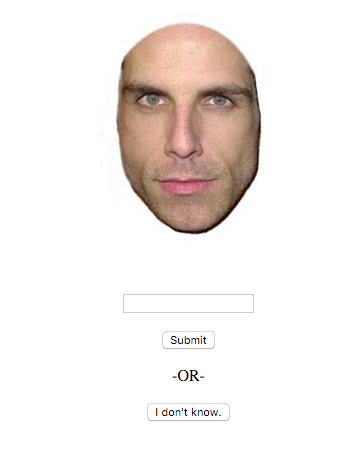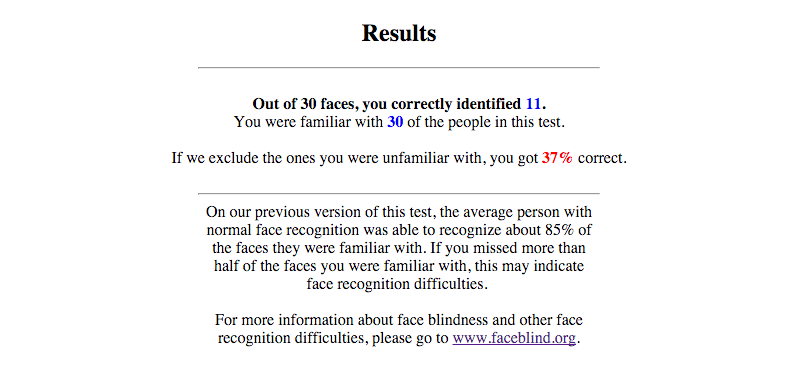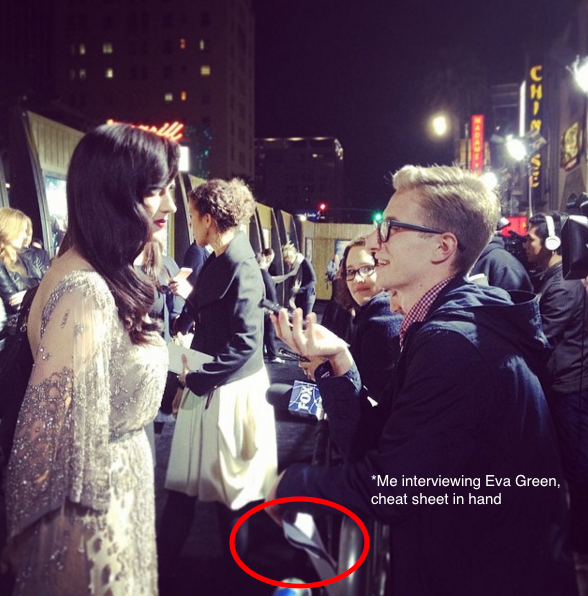What It's Like to Live with Prosopagnosia

By:
Earlier this month, I attended a holiday party at a co-worker's apartment. I took off my coat, placed a bottle of wine on the counter, and walked over to the kitchen to introduce myself to a person whom I presumed was a stranger. I shook his hand and everything before I finally noticed the look on his face. It was a look that said, "we've already met." It was a look that I've gotten more times than I'd like to admit.
RELATED: The Science Behind Why Some People Can Taste Words
Immediately, I apologized. I began to recall the time I met him at a company happy hour. And the time before that when I met him at his own apartment. All of these encounters happened within the last three months, and each time, we'd had extended conversations. My face got red as I tried to explain.
They call it face blindness, or prosopagnosia (Greek: "prosopon"="face," "agnosia"="not knowing"). It's a cognitive condition believed to affect about two percent of the general population, characterized by an inability to recognize faces. Some people have it worse than others; some people are born with it while others may develop prosopagnosia later in life, perhaps due to head trauma or as a complication of a degenerative disease.
.jpg?auto=format&crop=faces&fit=crop&q=60&w=736&ixlib=js-1.1.0) Wikimedia - wikimedia.org
Wikimedia - wikimedia.org
For my part, I'm not sure when it started. I remember first reading about prosopagnosia in high school after a few dozen socially awkward experiences motivated me to research my facial recognition problem. The symptoms added up: difficulty recognizing faces I've seen numerous times, reliance upon non-facial information to identify people (hair, gait, voice, etc.), trouble following the plot of TV shows and movies because I can't track the characters, and so on.
I find it particularly difficult to recognize faces out of context. A classic example of this would be the time I saw my high school's assistant principal at the mall and wondered why this unfamiliar woman was walking up to me as if she knew me. Of course, she did. She led the honor society for which I served as vice president—but you could've fooled me. Off school grounds, she appeared entirely alien. This is another common symptom of face blindness.
Fortunately, my case is moderate compared to other prosopagnosia sufferers. In extreme cases, people mistake their closest relations. They fail to recognize their parents and spouses, and the condition can even extend to the inanimate, making it difficult to identify cars and animals.
"Many also report problems with other aspects of face processing: They find it difficult to judge age or gender, recognize emotional expressions, or follow the direction of a person’s gaze," The Atlantic reported. "A substantial portion report navigational difficulties, because their sense of direction is impaired."
My girlfriend jokes that I don't actually have face blindness and that I'm just inattentive. I'm sure there's a grain of truth in that, and it's hard to be sure. Research about prosopagnosia is limited, and there are few neuropsychological assessments designed to test facial processing skills. From time to time, I take an online self-assessment called the "famous faces test." It was created by experts at the Prosopagnosia Research Centers at Dartmouth College, Harvard University, and University College London.
Here's how it works: a famous face pops up on the screen. Their hair has been cropped out of the photo. You're instructed to type the name of the person. There are 30 people in sum, including recognizable politicians, actors, and musicians.
 Prosopagnosia Research Centers - faceblind.org
Prosopagnosia Research Centers - faceblind.org
For most people, the name of the face pictured above is a no-brainer. It's Ben Stiller. I, like most people, have seen plenty of his films. But unlike most people, I was unable to recognize him out of context and without his hair. This was my final score:
 Prosopagnosia Research Centers - faceblind.org
Prosopagnosia Research Centers - faceblind.org
While I was "familiar with" all 30 people, I could only recognize the faces of 11. Having missed more than half of the faces I was familiar with, I can reasonably conclude that I have "face recognition difficulties."
But famous faces are easier to identify than those of acquaintances. The only time I encountered problems recognizing famous people was during my stint as an intern at The Hollywood Reporter, which involved reporting on movie premieres and interviewing cast members from the red carpet. If it weren't for the fact that they handed out cheat sheets with the names and faces of celebrities walking down the carpet in advance, I would've been totally lost.
 Kyle Jaeger
Kyle Jaeger
RELATED: The Difference Between a Personality Quirk and a Psychological Disorder
There is no cure for face blindness. While doctors and researchers have made progress in identifying the regions of the brain that are responsible for facial recognition, studies have not produced any treatment option for people with prosopagnosia. Again, I'm lucky. I've been able to cope with the moderate impairment by developing tricks and techniques to guide me through the social hurdles that the face-blind population encounters.
Others aren't so lucky. But with greater awareness come greater social acceptance. And I've learned that being forthright about the condition can make all the difference.
